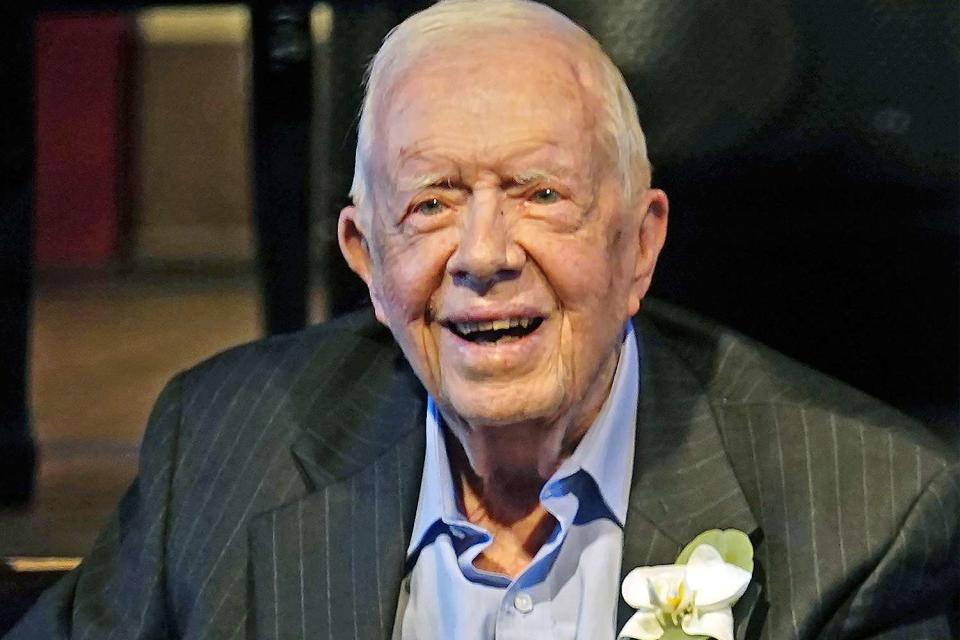Jimmy Carter's Choice to Utilize Hospice Care Is 'Intentional,' Expert Believes
- Oops!Something went wrong.Please try again later.
- Oops!Something went wrong.Please try again later.
- Oops!Something went wrong.Please try again later.
The growth of hospice in the U.S. is due in large part to policies that were advocated for during the time of the Carter administration

It was late February when The Carter Center announced in a statement that former President Jimmy Carter had "decided to spend his remaining time at home with his family and receive hospice care instead of additional medical intervention."
Carter's choice to use hospice, an expert says, is likely "intentional" — and reflects the former president's close personal ties to the benefit that made it possible.
The goal of hospice is to ease the suffering of those in their final stage of life — both physically, through the administering of medications, but also mentally and spiritually. Hospice programs also cater to loved ones with things like grief counseling and training.
Related:Jimmy Carter's Hospice Care Is Not Unusually Long, Expert Says: 'Average Is 60-70 Days'
And as Jonathan Fleece, president and CEO of non-profit hospice organization Empath Health explains, the growth of hospice in the U.S. is due in large part to policies that were advocated for during the time of the Carter administration.
"Hospice was added to the Medicare benefit [in 1982]" Fleece tells PEOPLE, noting that the benefit was rolled out shortly after Carter left office. "So hospice has been a very important part of the president's presidential service and policy from a public health perspective."
Fleece also explains that hospice as we know it today is rooted in a little-known love story.
"Hospice was created by a woman outside of London named Cicely Saunders in 1967. She was a nurse and was taking care of her companion at the time and he was a Jewish escapee from the Nazi occupation," Fleece says.
He continues: "They fell in love and he succumbed to cancer. Cicely ended up being not only a nurse but his loving caregiver and watched the man she loved die of a high-suffering death. She decided after that experience that humanity needed a better, more compassionate way to help people die. So she started the hospice movement in a small facility outside of London called St. Christopher's."
Hospice programs began sprouting up in America in the 1970s but it wasn't until 1982 that hospice "took its flight," Fleece says, in a significant way.
That's when a 1982 federal bill made hospice a benefit under Medicare, allowing millions of Americans to reap the benefits of end-of-life care.
"Even in his final days of life, by entering into hospice, he's doing that with intention," Fleece posits.
Related:Former U.S. President Jimmy Carter, 98, to Begin Receiving Hospice Care
As he explains, hospice care isn't strictly relegated to the final days and weeks of someone's life. In fact, many choose to use hospice care for several months at a time.
"A lot of hospice care is not 24/7. It's in and out of the home and working with the family and caregiver to be able to support their loved one," he tells PEOPLE. "So we teach them a lot of different ways to help, whether it's helping with bathing or administering medication or keeping them comfortable."
Hospice care can also include things like veterans programs (Carter, being a veteran, would likely be provided with a pinning ceremony, in which a decorated soldier administers a flag with military honors) as well as things like full medical care and spirituality support.
Never miss a story — sign up for PEOPLE's free daily newsletter to stay up-to-date on the best of what PEOPLE has to offer, from celebrity news to compelling human interest stories.
For Carter, that means it will allow him to live out his final days surrounded by the ones he loves — and continue his own love story with his wife, Rosalynn Carter.
As Fleece surmises about Carter's choice to utilize hospice care: "I think he not only felt that that was the best choice for him and his family but I also think in a very admirable way, he wants to intentionally put hospice into the American conversations, as perhaps one of his final acts."
For more People news, make sure to sign up for our newsletter!
Read the original article on People.

